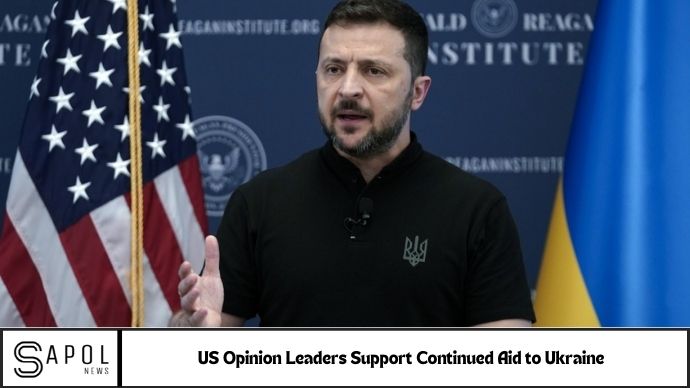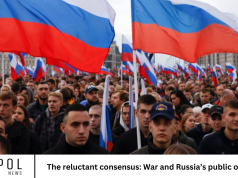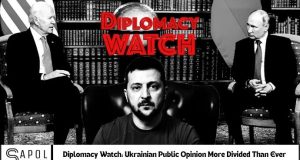US Opinion Leaders Support Continued Aid to Ukraine While U.S. opinion leaders from both political parties, as well as Democrats and Independents among the public, largely support ongoing assistance to Ukraine, everyday Republicans stand out for their growing opposition.
The situation in Ukraine may be one of the most consequential foreign policy issues as the U.S. approaches the 2024 presidential transition. After a recent trilateral meeting with French President Emmanuel Macron and Ukrainian President Volodymyr Zelenskyy, President-elect Donald Trump expressed his intent to push for a ceasefire between Russia and Ukraine, stating that he is “formulating a concept of how to end that ridiculous war.”
Recent surveys, including the Chicago Council on Global Affairs-University of Texas poll and the 2024 Chicago Council Survey, show strong backing for continued military and economic aid to Ukraine among foreign policy experts and the general public. However, the Republican public has emerged as a notable exception, with many expressing skepticism about further U.S. involvement. Their opposition appears to be influenced by the “America First” stance and Trump’s critical comments about Ukrainian President Zelenskyy.
This article delves into the key findings of these surveys and explores the sharp partisan divide over U.S. support for Ukraine, highlighting the growing tension between opinion leaders and everyday Republicans on the issue.
Why Do U.S. Opinion Leaders Support Continued Aid to Ukraine?
The issue of continued military and humanitarian aid to Ukraine has become more pressing as the war between Russia and Ukraine persists. U.S. opinion leaders argue that supporting Ukraine is not just about helping one nation but about preserving international stability, democracy, and the global rule of law.
Key Reasons Behind Continued Support:
Preserving Global Security: U.S. opinion leaders argue that Russia’s invasion of Ukraine threatens not just the sovereignty of a single nation but also the security of Europe and the broader international system. By assisting Ukraine, the U.S. is preventing the further destabilization of the region, which could spill over into NATO countries. This approach is seen as vital for protecting U.S. allies and maintaining peace across Europe.
Upholding Democratic Values: Support for Ukraine is framed as a defense of democracy against authoritarianism. Leaders in the U.S. often emphasize that standing by Ukraine sends a message that democracies will defend their sovereignty and human rights, setting a precedent for other global conflicts.
Preventing Escalation and Deterring Further Aggression: There is a strong argument among U.S. opinion leaders that if Russia’s aggression goes unchecked, it could embolden the Kremlin to pursue further territorial expansion in Europe and beyond. Continued aid to Ukraine is seen as a way to deter future aggressions and reinforce the idea that the international community will stand against territorial expansion by force.
The Strategic Impact of U.S. Support for Ukraine
Support for Ukraine is not only viewed through the lens of immediate military aid but also in terms of its strategic impact on global geopolitics.
Military Assistance and Defense Strategy: U.S. opinion leaders, including military experts, highlight the importance of sending advanced weapons systems to Ukraine, such as air defense systems and precision-guided artillery. This military aid helps Ukraine defend itself more effectively and sends a strong signal to Russia about the U.S.’s commitment to Ukraine’s security.
Economic and Humanitarian Support: Beyond military aid, the U.S. has provided significant financial support to Ukraine’s economy. This includes funds for reconstruction, humanitarian aid, and economic stabilization, which help Ukraine continue its fight against Russian occupation while preparing for long-term recovery.
The Global Leadership Role of the U.S.: For many opinion leaders, U.S. support for Ukraine is a test of American leadership on the global stage. By championing Ukraine’s cause, the U.S. reinforces its position as a leader of the Western alliance and promotes the values of freedom and democracy that it has long espoused.
U.S. Political Divisions: A Barrier to Unified Support?
While opinion leaders largely favor continued support for Ukraine, U.S. political divisions remain a challenge. Some lawmakers and figures in the Republican Party have voiced opposition to additional financial and military aid, arguing that the U.S. needs to focus more on domestic issues. The question remains: can the U.S. maintain bipartisan support for Ukraine, or will the political divide threaten continued assistance?
Bipartisan Support: Despite opposition from some quarters, bipartisan support for Ukraine has remained strong. Leaders from both major political parties continue to stress the importance of supporting Ukraine to ensure global stability, security, and the defense of democracy.
Impact of Domestic Politics: As the 2024 U.S. election approaches, the debate over Ukraine’s future aid package will likely intensify. The outcome of the election could determine the future of U.S. support for Ukraine, depending on the party in power.
The Broader Global Implications of U.S. Support
The ongoing support from U.S. opinion leaders has far-reaching consequences for the international community.
Strengthening NATO and European Security: U.S. assistance to Ukraine strengthens the NATO alliance and reassures European nations of America’s commitment to their security. This is critical, as NATO countries look to maintain a united front in the face of Russian aggression.
Setting a Precedent for Global Cooperation: The continued U.S. support for Ukraine underscores the importance of international cooperation in addressing geopolitical conflicts. By assisting Ukraine, the U.S. is demonstrating that global stability and the rules-based international order are worth fighting for.
May you also like it:
War Speeches: Diplomatic and Political Implications of Russia’s War Against Ukraine in October
Russia Increases War Budget as Ukraine Plans to Ramp Up Arms Production
Ukrainian Opinion Survey Tracks Fluctuating Views on Quick End to War
Conclusion
The consensus among U.S. opinion leaders is clear: continued support for Ukraine is not only a moral obligation but a strategic necessity for maintaining global stability. While political divisions may exist, the overwhelming majority of influential voices in the U.S. see the war in Ukraine as a test of international resolve, one that will have lasting consequences for global peace and security.
FAQs:
1. Why do U.S. opinion leaders support continued aid to Ukraine?
U.S. opinion leaders support aid to Ukraine to preserve global security, uphold democratic values, and prevent further Russian aggression.
2. How does continued aid benefit global security?
Continued aid helps deter Russia’s territorial expansion and strengthens NATO’s collective defense, promoting stability in Europe.
3. What types of support is the U.S. providing to Ukraine?
The U.S. provides military, financial, and humanitarian support, including weapons, economic aid, and reconstruction efforts.
4. Are there political divisions in the U.S. regarding Ukraine?
Yes, some lawmakers oppose further aid, citing domestic concerns, but overall bipartisan support remains strong.
5. How does U.S. support affect NATO?
U.S. support for Ukraine strengthens NATO and reassures European allies of America’s commitment to security.
6. What are the long-term benefits of U.S. support for Ukraine?
Long-term benefits include global stability, a stronger international rule of law, and a robust deterrence against future aggressions.





